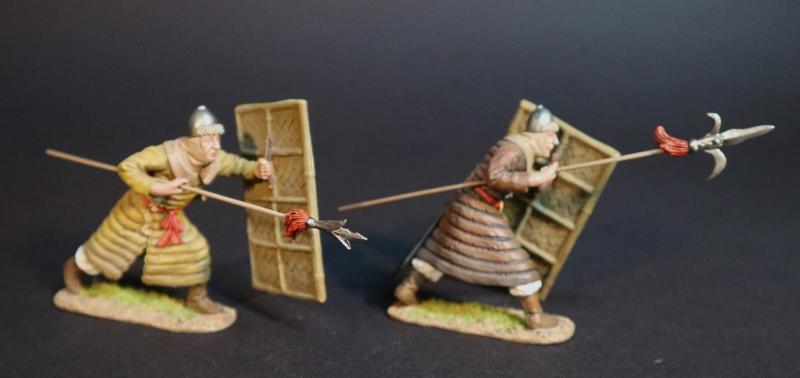Two Korean Auxillary Spearman (one each in brown and yellow armor), The Mongol Invasions of Japan, 1274 and 1281--two figures (yellow, leading with shield; brown, spear pointed up and forward)
$90.00
Item Number: MIJ-18A
Two Korean Auxillary Spearman (one each in brown and tan armor), The Mongol Invasions of Japan, 1274 and 1281--two figures (tan, leading with shield; brown, spear pointed up and forward)
Major military efforts were taken by Kublai Khan of the Yuan Dynasty in 1274 and 1281 to conquer Japan after the submission of Korea. Ultimately a failure, the invasion attempts are of historical importance because they set a limit on Mongol expansion and rank as nation defining events in the history of Japan.
The invasions are referred to in many works of fiction and are the earliest events for which the word “Kamikaze” (Divine Wind) is widely used, originating in reference to the typhoons faced by the Yuan fleets.
The invasions were one of the earliest cases of gunpowder warfare outside of China. One of the most notable technological innovations during the invasions was the use of explosive, hand thrown bombs.
The main invasion of Japan started at Hakata Bay. All available accounts describe the style of the Invasion forces fighting, leaving the Japanese defenders confused. The unfamiliar tactics in which the Mongol, Chinese, and Korean soldiers advanced on foot in large and comparatively dense groups protected by shields, controlled by drums and the accompaniment of much noise, required a major reconsideration of traditional Japanese fighting techniques.
The tradition of selecting a worthy opponent for one’s arrow, needed a major re-think. In a Japanese battle, it was the practice to seek out a worthy opponent and fight to the death, but in this battle the Mongols “attacked all together with great vigour.”
The fighting of the first 24 hours of the invasion was fierce, and, within little more than a day, the Mongols had established a bridgehead.
The Mongols advanced as far as Mizuki, (water castle), an earthwork moat fort dating back to 664, and it was here that the fighting reached its climax. The Samurai defenders were under the command of Shoni Kagesuke. He was with two companions when they noticed Liu Fuxiang, a senior Mongol commander, who had come within bow range. Kagesuke took aim and shot the Mongol commander in the face.
It is believed because of the loss of this important leader the Mongol advance was stalled, and a withdrawal began back to the ships.
With this tactical withdrawal, the first invasion concluded, because the armies never again left their ships for Japanese soil. Instead, they set sail back to Korea.
A passage in a Japanese text describes the following
“The Mongols disembarked from their ships, mounted their horses, raised their banners, and began the attack. The grandson of the Japanese commander in chief Shoni Nyudo Sukeyoshi, who was barely 12 or 13 years old, loosed a signalling arrow with a small head (to start the battle), but all the Mongols just burst out laughing. They beat large drums and banged gongs and sometimes fired bombs made from paper and iron. The Japanese horses were so frightened by these stupendous sounds that they could not be controlled. Because they could not handle their horses, none could face the enemy. The short Mongol arrows had their tips smeared with poison. Some thousand men in all were prepared with their arrows and fired them so that they fell like rain. Halberds and long shafted weapons were carried with no empty space between them….”
“The commander in chief of their army took up a position on high ground, and when they had to pull back, he beat the drum of retreat. When they were to advance, he struck the attack gong.”
Released in JULY 2024.
